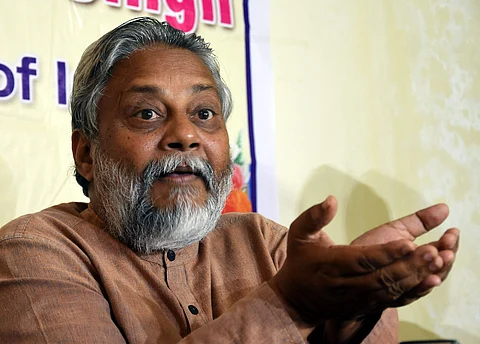

As a 27-year-old, Rajendra Singh was treating night blindness that plagued the people of Gopalpura in Rajasthan. Armed with a degree in Ayurvedic Medicine and Surgery, he would treat the patients over a period of six to seven months. One old man, after being cured, came up to him to rue the very fact that he was cured. He told him, "At least people used to fill water for me before. Now I will have to do it myself!" It was at this very moment that Singh had an epiphany, he knew he had to dedicate his life to the cause of water conservation because treatment was not the solution, water was. Though he was bestowed with the title Waterman of India much later, his journey started in that one defining moment.
Singh's tale is a well-told one. Advocating the old methods of building johads (traditional and community-owned rainwater storage tanks) or earthen check dams, he and the community started working with Gopalpura Johad and today, he has built over 8,600 johads. He has also been credited for reviving five rivers in Rajasthan along with the NGO, Tarun Bharat Sangha. The world woke up to his work and a slew of prestigious awards like the Ramon Magsaysay Award (2001) and the Stockholm Water Prize — also known as the Nobel Prize for Water (2015) — found their way to him. We had the chance to ask the Jal Purush (Waterman) about his fearless nature, his relentless dedication and his determination to speak the truth. This is what he had to say.
Were you always confident about our traditional and indigenous knowledge?
It was the people who were confident. The dream that, one day, the village will have water and all those who have left the place in search of a better life will come back and start agriculture here, was already alive in them. We just started the work.
What were some of the major problems that you faced?
Using the Irrigation Drainage Act, 1954, a lot of officials created obstacles and put them in my way. About 300 such cases were lodged against me, but when the then President of India KR Narayanan came to see my work in 2000, all the cases disappeared.
On one hand, you have been hard on initiatives such as Rally for Rivers, stating that missed calls can't rejuvenate rivers, you have also praised the Telangana government for the Kaleshwaram and Devadula lift irrigation schemes. Speaking the truth, no matter what, must have come at a great cost.
What I am scared about is humankind and nature, I am scared for and of nothing else. I am disciplined and present the truth like it is. I am not attracted to or greedy for power which is why I am not scared of it either. If I wanted power, then I would be scared of it and would have weighed my words. Telling the truth comes at a great cost, but I am not afraid and have chosen the path I want to tread on, so I can speak the truth.
Since you were a student activist yourself (he was a part of student activism organisation Chatra Yuva Sangarsh Vahini, a National Service volunteer and more), what do you have to say about youngsters like Greta Thunberg?
Greta is angry, as she should be. But for our collective future, not for herself. She is being invited to various parliaments and even the UN to speak and many governments are listening to her. But in our very own country, there are greats like Sadhvi Padmavati, who was fasting for the protection of River Ganga and was admitted in AIIMS, and Swami Atmabodhanand, who was also fasting, who are doing a lot. Why don't we listen to them? Why doesn't our government take them seriously? I strongly believe that compassion is dead in Indian politics. If Gandhiji would have been alive, seeing the privitatisation of water with regards to water bottles, he would have protested.
And what about the government?
Vikas ke naam par, woh vinash kar rahe hain (In the name of progress, it is destroying). Never have environmental clearances been given in this way. Pollution, encroachments, over-extraction, contamination — it has permitted a lot of things.
You must have a message for the young students of India
We have to learn from our own indigenous knowledge system. When people remembered that we are all made of the panch mahabhoot — Akash, Prithvi, Vayu, Agni and Jal (the five elements — space, Earth, wind, fire and water), we respected all the elements. Now that we have forgotten this, we disrespect elements and have nothing to offer to the world. If we want to be sone ki chidiya (the golden bird) of the world again, we must respect nar, nari and neel (man, woman and water). This is the only way.
